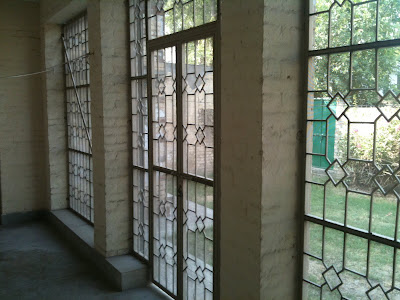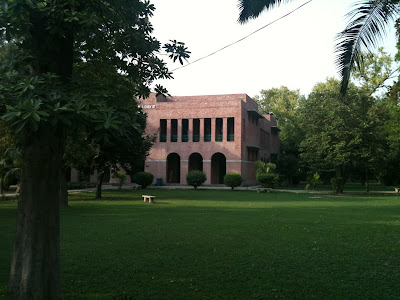David James is the Rector's driver (and is helping me navigate the streets of Lahore while I am here visiting). He is one of the kindest, friendliest people I have ever met. I suspect that many people (especially Americans) do not pay David James much heed -- as he is quiet, unassuming and a bit bashful. But, since I am an "uber" extrovert and love talking to everyone from all walks of life, I can't help talking to David James every opportunity I get -- because I sensed when I met him that he has a lot to say based on the lifetime of experiences worn in wrinkles on his otherwise gentle face.
David James is an expert driver - and it is difficult in Lahore, where the highways and side streets are riddled with every type of transport possible (including cars, trucks, taxis, donkey carts, donkeys without carts, motorbikes, scooters, bikes and, yes, even pedestrians on the highways). Oh, and the lines on the roads mean absolutely nothing in Pakistan. If there is a navigable passageway between a sidewalk and a donkey cart, David James can successfully pass through it with ease and without even a scratch. I've come to trust James' skill and choose simply not to look at the road ahead....
David James has been a professional driver for 34 years, one year less than he has been married. He
explained that his marriage was "arranged" by his mother and his wife's mother (and arranged marriages are still very common in Pakistan, in roughly 70% of cases). When he met his soon-to-be wife, he fell madly in love and wanted to marry her immediately, but her family said, "No, you must wait three years so that we can save up for a proper wedding and dowry," which is customary in Pakistan. James objected and told her family that he would pay for the wedding himself because he loved her too much to wait. This is chivalrous and romantic for certain, but it was also a cultural risk since there was the possibility of
insulting the family of the bride.
They have been happily married for 35 years and have seven children (5 girls and 2 boys). Three of his five girls are married and he is eagerly awaiting the marriages of the other two.... One of his daughters is a student at FC College and is studying business, but James hopes that she marries quickly after graduation. David James also has 8 grandchildren whom he adores and they all call him "Papa," which he indicates can be quite noisy when they all seek his attention.
David James is amazing in many ways. For example, he has no formal education, but is fluent in four languages (English, Punjabi, Urdu and Hindi). He has worked for every major U.S. and International agency possible, e.g., United Nations, USAID, U.S. Embassy, and has been stationed all over the region - Afghanistan, Iraq, Iran, India, Pakistan, and Syria. He has lived and worked abroad without his family - for upwards of 2-3 years at a time. And, he is proudly Catholic, which he states with complete conviction, even knowing that such an assertion in public in a Muslim country could result in violence. David James told me of the days when Karachi, Pakistan and
Afghanistan were amazing places to live and work, but that he would never go back to either because of the sectarian "targeted" killings and
terrorist threats, especially to Christians.
When I meet someone like David James, who has an amazing history, peaceful perspective and vision as well as a host of experiences that make him a deep and complex person, I cannot help but realize how we underestimate this region of the world -- and all it has to offer us as Americans. David James invited me to have dinner with him and his entire family and I sensed that was not an invitation that is extended to many foreigners (since people at FC College were a bit surprised when I mentioned the invitation). I am absolutely eager to meet the rest of his family and experience a meal with them - I have a feeling that above all the yelling for "Papa's" attention, it will be an amazing experience....
 Here are a couple more photos of my life in Pakistan. The house is a campus home for faculty and staff - and you can see the little bit of American culture over the fence, i.e., a basketball hoop!
Here are a couple more photos of my life in Pakistan. The house is a campus home for faculty and staff - and you can see the little bit of American culture over the fence, i.e., a basketball hoop! 



























